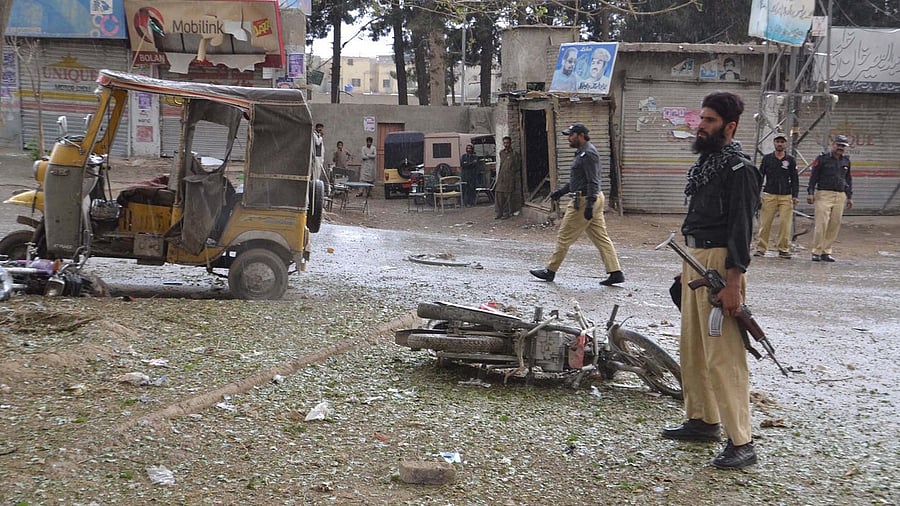
Balochistan. Representative image.
Credit: iStock Photo
Since India launched Operation Sindoor in response to the terror attack in Pahalgam on April 22, escalating cross-border tensions with Pakistan, the Balochistan Liberation Army (BLA) has aggravated Pakistan’s fragile internal security situation. Balochistan’s provincial capital, Quetta, has seen a series of attacks.
Recently, two strikes by BLA rebels resulted in the death of 14 Pakistani soldiers – an IED was used to target a military convoy in Shorkand, blowing up an army truck; the second attack was carried out in Kech’s Kulag Tigran area. Before this upsurge, the hijacking of the Jaffar Express had made global headlines. Recently, a strategically important gas pipeline was blown up by the rebels. Of late, the scale and form of these attacks have increased and diversified.
As part of Operation Herof 2.0, initiated recently by the BLA, more than 78 attacks have been carried out in 58 locations with key military posts and security infrastructure. Baloch fighters even took control of a key highway at Ornach Cross in Khuzdar for a few hours. Recently, four undercover intelligence agents of Pakistan were captured and executed. A week ago, Baloch leader Mir Yar Baloch declared independence from Pakistan and appealed to the Indian government to recognise the Republic of Balochistan. Though the declaration of independence may seem symbolic, it is an escalation on the ground. An appeal was also made to the media and the citizens in which the rebels indicated that they were “not Pakistani but Balochistani”. Mir Yar Baloch even supported India’s stand that Pakistan should leave Pakistan-occupied Kashmir (PoK).
In 1948, Balochistan was a semi-autonomous province under the Khanate of Karat. It became a part of British India in 1870. At the time of partition, Balochistan was a part of four provinces, viz., Kharan, Las Bela, Makaran, and Kalat. The first three joined Pakistan, as Jinnah offered them equal status. Kalat decided to remain independent. Jinnah insisted that Kharan and Las Bela should join Kalat to form Balochistan. Kalat declared independence. Nehru’s Home Secretary V P Menon has written that the Khan of Karat had pressed India for Karat’s accession to India. However, Jinnah forced its ruler Mir Ahmadyar Khan to join Pakistan, by mobilising the Pakistani army on March 26, 1948. Many historians opine that this region was annexed at gunpoint. This has since resulted in several revolts led by the Balochis who perceived Pakistani control of the region as a form of recolonisation.
The Pakistan state has responded to the recent Baloch nationalist upsurge by arresting and killing protestors in places such as Quetta, Turbat, Panjgur, Mastung, and Naseerabad. Many have disappeared without a trace. Those arrested have been charged with treason, sedition, and murder, under the draconian Section 3 of the Maintenance of Public Order, 1960. Total digital blackouts have been introduced in some of these towns, especially Quetta – Pakistan has resorted to a massive “sanitisation programme”. The matter has been compounded by the Panjabi bias among senior officers in the Baloch regiment. Islamabad’s propensity to remain in political denial has only compounded matters.
India is watching
For Balochistan to shift from de facto control to de facto independence, it will require external validation. Baloch leaders have been working in this direction. Pakistan has been waging a silent war on the Balochi populace for years now. Islamabad seems to be underestimating the resilience of the Baloch people who have a history of marginalisation and insurgency. While the people of Balochistan aspire for peace and prosperity, the question is whether this can happen within the larger body politic of Pakistan or by carving out an independent space for themselves.
The recent developments in Balochistan also pose a diplomatic dilemma for India. Let’s not forget that Somaliland in Africa declared itself independent in 1991 and yet, remains unrecognised internationally. New Delhi has responded by raising human rights issues, relating to the treatment of the Balochis. India should avoid getting into a proxy war and also lose its high moral ground on the issue of Kashmir. Recognising Balochistan at this point will come with a new set of complex geopolitical challenges for India, even if the Baloch leaders expect India to do so. So far, the Indian government has maintained a studied silence on the issue and desisted from hasty responses in what is currently a highly volatile geopolitical climate. The response to the evolving situation will be a diplomatic tight-rope walk for New Delhi.
(The writer is a professor in the Department of International Studies, Political Science and History, Christ University, Bengaluru)